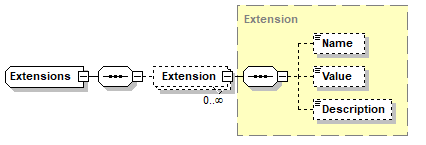Extensions
DRAFT DOCUMENTATION
Please note that this documentation is in draft and is not finalised.
We would encourage you provide any comments, questions, or suggestions for changes by use in-line commenting on this page. To do so simply highlight a section of text and then click on the "Comment" option that appears.
1. What are Extensions
The data standards facilitate the sending and receiving of data between systems across a range of common usage scenarios. However, the standards are designed so that they can also be used for new or very specific purposes simply by adding in any extra information that needs to be transferred. If the standards don’t contain a field that both parties would like to exchange, an organisation can use Extensions to include as many of these extra fields as needed without breaking the core schema.
2. Extensions Schema
To see a graphical representation of the data model (schema) for the Extensions entity please expand the link below:
3. Examples
Where new usage scenarios develop over time that rely on extensions that become widely and consistently adopted, these can be considered for incorporation into the standard definition as a recognised data element. This process will allow the standards to continuously evolve and adapt over time based on changing needs. The decision on which extensions or new data fields are to be added to the core schema will be taken by the TODS governance body (currently TBC) based on a request for comments (RFC) process involving stakeholders.
Related Information
- Introduction to the Person
- Introduction to Rankings
- Introduction to the Tournament
- Introduction to Participants
- Introduction to the Event
- Introduction to the Stage
- Introduction to the Draw
- Introduction to the Match
- Introduction to Ties
Go back to Tennis Open Data Standards home page.
